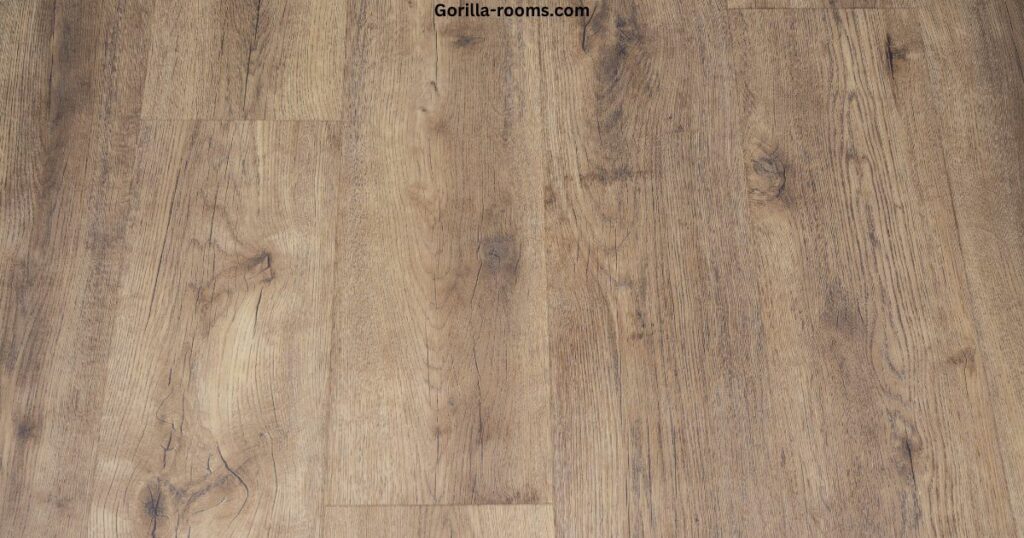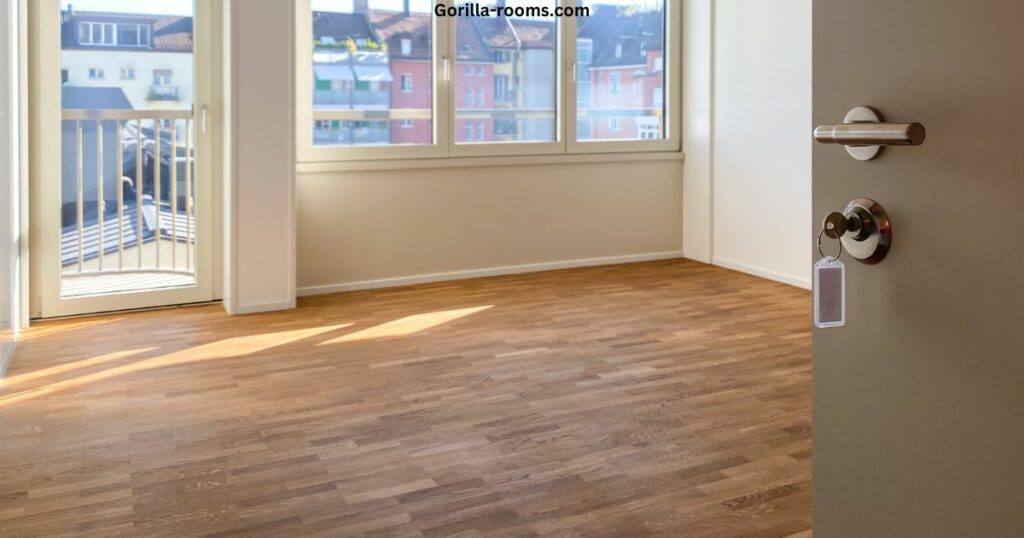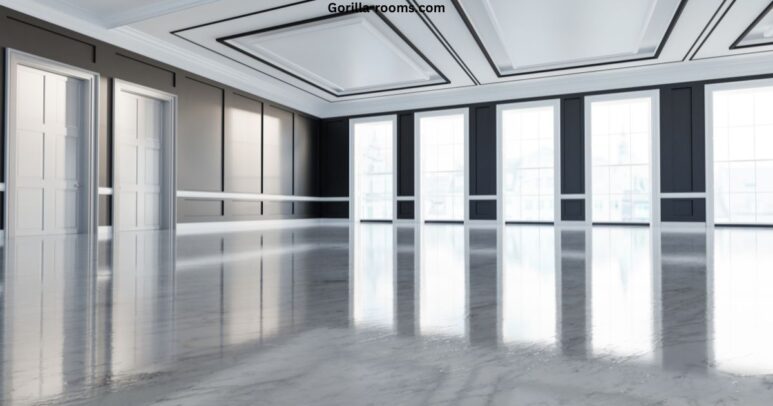This article will explain why vinyl floors are slippery and how you can make vinyl floors less slippery.
When vinyl flooring becomes wet, it becomes more slippery. Furthermore, any greasy liquid, dust, or moisture causes the vinyl floors to become slippery. As a consequence, vinyl flooring is slick.
If necessary precautions are not followed, these flooring composed of smooth polyvinyl chloride can lead to dangerous slipping accidents.
Is vinyl flooring slippery?
Yes, The vinyl floors are slippery. When these floorings are wet, they become extremely slick. Vinyl floors may appear to be wood, but they are made of plastic, as we have previously discussed. As a result, they have the property of being slippery.
Slippery vinyl floors are caused by moisture, grease, dust, floor polish, and soap; these are among the primary reasons for causing floors to be slippery.
To begin, you should try to avoid or reduce the presence of these materials on your floors.
Some people confuse Vinyl flooring with wood and think they are not slippery.
But Vinyl flooring, on the other hand, is constructed of smooth polyvinyl chloride, not natural wood. As a result, they have the property of being extremely slippery, increasing the risk of an accident.
When vinyl flooring becomes wet, it becomes more slippery. Furthermore, any greasy liquid, dust, or moisture causes the vinyl floors to become slippery. As a consequence, vinyl flooring is slick.
How To Make The Vinyl Floor Less Slippery?

There are various ways to fix slippery floors, but not all of them work effectively on vinyl flooring. It’s important to select products that perform well with polyvinyl chloride, are durable, and are simple to install or apply.
1- Anti-slip mats and rugs
To prevent slipping on a vinyl floor, use anti-slip mats and rugs. The bottoms of these mats and rugs are rubbery to stop them from sliding about on the floor. Place the carpets and rugs where you walk the most in the house.
2- Anti-slip spray
The anti-slip spray is a more cost-effective option than the other methods. The floor will be nonslippery after using this spray. However, make sure that the spray doesn’t include anything that could harm your floor.
If the slippery surface is small or uneven, non-slip sprays are an affordable option to consider.
Extra Fine Clear Spray is an epoxy aerosol spray that gives interior and exterior vinyl floors a clear, rigid, finely textured surface.
It’s simple to apply, barefoot-friendly, chemical-resistant, and almost invisible. They are efficient, reasonable, and provide waterproof nonslippery flooring.
3- Anti-slip coating
Anti-slip coatings are specially designed to increase slide resistance on floors while maintaining a pleasing appearance. It’s a simple and inexpensive solution.
Floor Grip is a vinyl flooring anti-slip coating that comes in a roll-on form. It provides a long-lasting, high-traction surface that is scratch and chemical resistant once applied.
It may be used on both interior and exterior floors, and it can also be utilized to make non-slip vinyl flooring for moist spaces. It comes in a gloss or matte finish to match the look of your floors.
4- Degreasing agent
Some sections of your home, such as the kitchen, become greasier over time. You can apply a degreasing product in these areas. This substance will protect the floor from becoming slippery.
5- Cleaning
Cleaning your vinyl flooring is a simple and common approach to make it less slippery. Clean the vinyl floor with a PH-neutral cleaner and allow it to dry completely. Avoid using too much vinegar as it can make the floor slippery.
6- Products that irritate the flooring should be avoided
Slippery vinyl floors are caused by moisture, grease, dust, floor polish, and soap. To begin, you should try to avoid or reduce the presence of these materials on your floors.
However, it is not always possible to eliminate them. So, you’ll need an additional solution to treat your floors to reduce their sickness.
7- Use a vinyl floor polish designed exclusively for this type of flooring
If you use the wrong kind of polish on your vinyl floors, it might create a slippery layer. To avoid this, it’s a good idea to invest in a polish designed specifically for vinyl flooring.
Most polishes are simple to apply and give your floors a beautiful shine, but they shouldn’t be used as a complete anti-slip solution for vinyl flooring because they still leave a smooth layer on the surface.
Why is my vinyl floor so slippery?

Vinyl flooring is smooth and slippery. Vinyl floors are the most slippery among all the wood-like floorings. You may have noticed that your vinyl floor is slick and getting slicker with each day.
Above, we have mentioned some causes of them being slippery. Let’s look into them deeply:
1- Natural characteristic
The natural property of vinyl floors is that they are slippery. Vinyl floors are composed of a smooth polyvinyl chloride that looks like wood but isn’t. As a result, the vinyl floors become slippery due to the plastic material.
2- Water and moisture:
Vinyl floors are generally more slippery than other surfaces regarding water and moisture. The presence of water and moisture increases the slickness of the floor. When the floor is moist, it becomes extremely slippery.
3- Grease and oil:
Greasy products and oily substances cause slippery vinyl floors. Even the floor can be accidental sometimes.
4- Dust:
Dust can make the vinyl flooring slippery. Dust can make the floor more slippery than a typical floor.
5- Cleaners and soaps:
You’ve probably noticed that the vinyl floor is getting a little slippery with each day. Cleaning the floor regularly could be the reason.
More cleaners and soaps may make the floor smoother and more slippery over time.
Is vinyl flooring less slippery than other floors?
The vinyl flooring is extremely slick. It has a smooth and slick texture despite its wood-like look. The vinyl floor becomes more slippery when there is any liquid on it.
When you clean your vinyl flooring regularly, the cleaning agents make it slippery, which can happen over time. The floor becomes even more slippery as time passes.
So, if you want to put vinyl flooring in your home, you must take precautions when doing so.
Is vinyl flooring slippery when it gets wet?
When vinyl flooring gets wet, it becomes more slippery than any other cause that makes it slippery. Vinyl flooring has a natural tendency to be slippery.
So, When the floor is wet, it becomes much more dangerous. Furthermore, cleaning the floor might make it quite slippery until it dries completely.
If you have children, pets, or elderly people in your home, you should use vinyl flooring with caution.
The floor may become wet unintentionally from time to time, yet anyone can slip on it. The vinyl floor turns slippery when wet with fluids, moisture, or other liquids. When the vinyl flooring is wet, you must be careful.
Additional Suggestions
- Even if your vinyl floors have a non-slip treatment, it’s essential to keep them clean at all times. This is because dirt and chemical residue can accumulate on the surface, making it smooth and slippery.
- Limited quantities of vinyl floor cleaning products can be used, and the floor can be cleaned with a moist mop. It’s also essential to make sure it’s thoroughly dry before using it.
FAQs
Is a slippery floor a danger or a risk?
When flat surfaces become wet, they become slippery. Leaking equipment (e.g., freezers, pipes), mopping, spilled drinks, and weather (snow/rain) tracked in from outside cause our flooring to become moist.
A small amount of moisture is all it takes to change a dry floor into a dangerously slippery surface.
What are the drawbacks to vinyl flooring?
Vinyl Flooring’s Drawbacks: It doesn’t feel quite as good when walking barefoot on vinyl. Natural hardwood will look more luxurious than vinyl.
Refinishing vinyl wood plank floors is not possible. If your LVP flooring is glued down, it can be difficult to remove if you want to replace it.
Is it necessary to use underlay with vinyl flooring?
The majority of vinyl floors do not require an underlayment. A well-cushioned vinyl floor should be fine on its own if the surface you’re laying on is level and smooth.
Is it true that vinegar damages vinyl floors?
Vinegar will not provide the gentle sudsy action required to clean vinyl. Furthermore, vinegar can harm the top surface of the floors, fading and darkening them with time and with frequent use.
Final verdict
Vinyl flooring is an excellent choice for your home. Vinyl flooring is the perfect option if you want a smooth, attractive surface. Furthermore, vinyl flooring is both easy to clean and long-lasting. But, vinyl flooring might be slippery at times if you don’t use the flooring carefully,
But Vinyl flooring, on the other hand, is constructed of smooth polyvinyl chloride, not natural wood. As a result, they have the property of being extremely slippery, increasing the risk of an accident.
Slippery vinyl floors are caused by moisture, grease, dust, floor polish, and soap; these are among the primary reasons for causing floors to be slippery.
And this slipperiness can be overcome by using anti-slip mats and rugs, anti-slip sprays, anti-slip coating, degreasing agents, and much more.
Related Posts:
How To Remove Scuff Marks From Vinyl Flooring?

